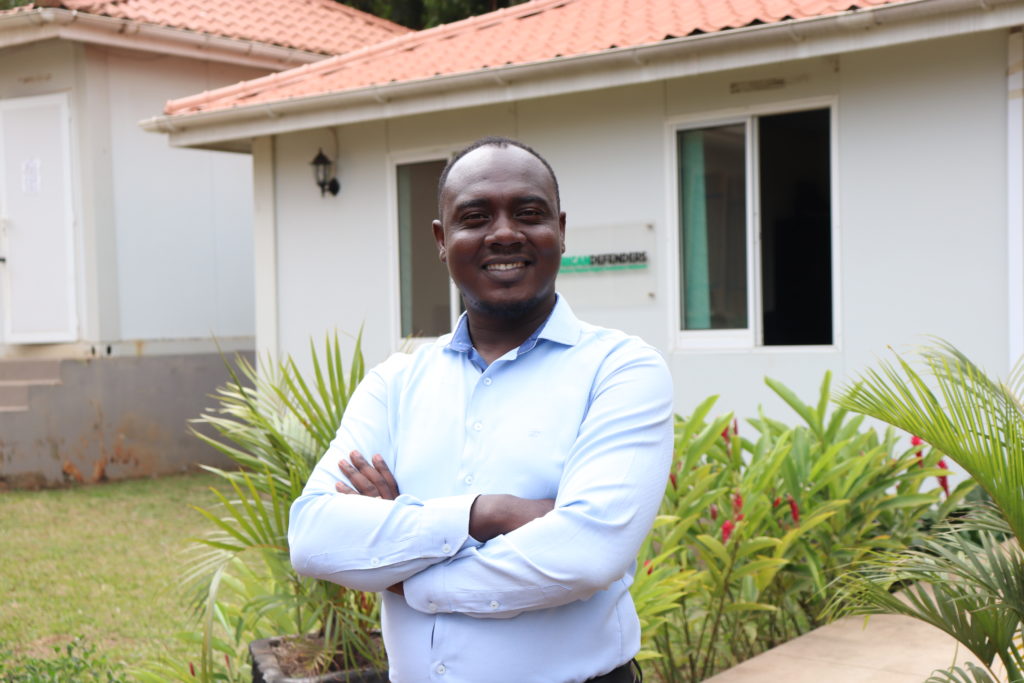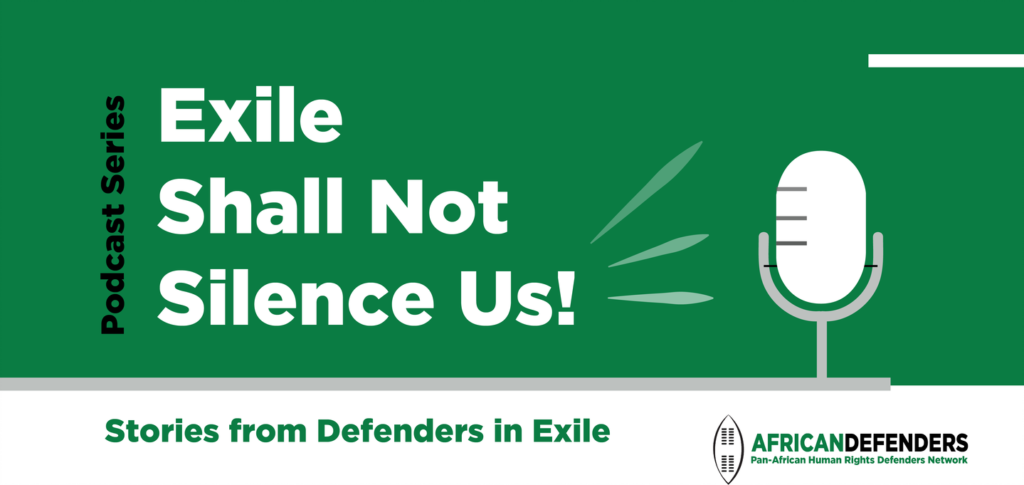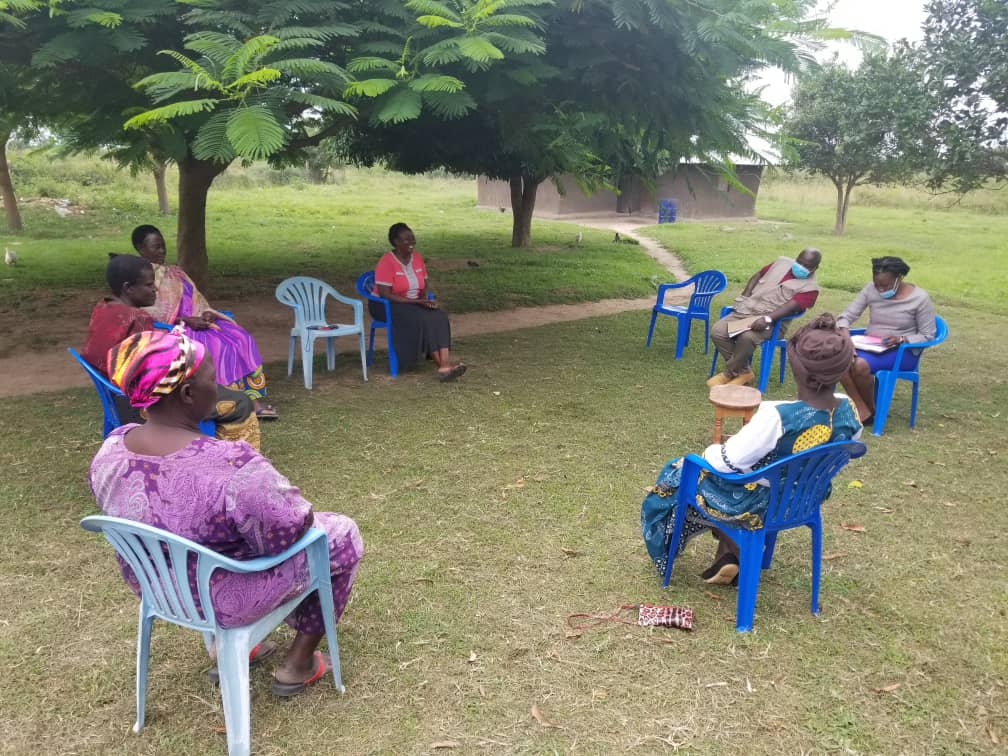Dear friends and colleagues,
While the world struggles to maintain some semblance of normalcy amidst the COVID-19 pandemic, let us refrain from being comfortable with the effects of the pandemic on human rights. In the past month, Uganda has seen more deaths due to the high-handedness of police than due to COVID-19. In the words of UN High Commissioner for Human Rights Michelle Bachelet:
“Discrimination kills. Depriving people of their social and economic rights, kills. And these deaths and harms damage all of society. COVID-19 is like a heat-seeking device that exposes, and is fuelled by, systemic failures to uphold human rights.”
Bachelet made these remarks at the 44th session of the Human Rights Council (HRC44), where we echoed her concerns in our own oral statement, including regarding women and girls. I also echoed these concerns during my statement at the 66th Ordinary Session of the African Commission on Human and Peoples’ Rights (ACHPR). We will continue to monitor the situation and protect HRDs.
Despite the setbacks, we continue to provide preventive and emergency support to human rights defenders (HRDs) to allow them carry out their crucial work. In July we resumed some physical protection trainings (and continued with online engagements), while respecting local health guidelines. The protection team travelled to Hoima and Buliisa district for follow-up trainings with HRDs. After our month of HRD well-being in June, our Well-being Lead and deserved HRD of the month, Karis Moses Oteba, .
Yours sincerely,
Hassan Shire
Executive Director, DefendDefenders
Human Rights Defender of the Month:
Karis Moses Oteba

Karis Moses Oteba is DefendDefenders’ Protection Officer and Well-being Lead, promoting self-care and effective stress management amongst human rights defenders (HRDs). He started defending human rights at the early age of 11, as a member of the children’s parliament, convened to listen to the views of children concerning Uganda’s 1997 Children’s Act.
“Within DefendDefenders’ protection department, we often encounter anger outbursts, owing to the desperate situations HRDs face. In the beginning I would argue back and forth with them, but I have learned to stay calm, and appreciate where they are coming from,” Karis tells us. While HRDs are particularly at-risk for mental health issues, they rarely get specialised help. Karis estimates that most HRDs seeking DefendDefenders’ protection, suffer from some underlying well-being issue, due to the nature of their work.
Did you know?
- That AfricanDefenders launched a podcast series in July? Check out Exile Shall Not Silence Us presenting AfricanDefenders research on exiled HRDs.
- That the Rapid Response Network and CiviCERT have developed a digital first aid kit? Take a look at their video.

Check out:
- Article: How Burundi’s independent press lost its freedom, The Conversation, July 2020
- E-Book: Strategic litigation and the struggle for Lesbian, Gay and Bisexual equality in Africa, Adrian Jjuuko, Daraja Press, February 2020
Recommended readings:
- DefendDefenders is hosting a SAFETAG digital security audit training. If you are a technololgist located in Uganda, apply!
- Jamlab is looking for applications from start-ups passionate about fixing what isn’t working in southern African media – apply here.
- The Citizen’s Coalition for Electoral Democracy in Uganda (CCEDU) is seeking a National Coordinator – apply here.
Updates from DefendDefenders:
- DefendDefenders’ Advocacy, Research and Communications Department continues its work despite the constraints associated with COVID-19 and remote work. We currently have staff members based in Kampala, Khartoum, Geneva, and Brussels, pending the reopening of Uganda’s and other countries’ borders;
- On 17 July 2020, the UN Human Rights Council concluded its 44th session (HRC44). The Council adopted over 20 resolutions, including one on Eritrea, which extended the mandate of the Special Rapporteur on the country. Read our press release; our oral statements to HRC44; and Hassan Shire’s Reflections on HRC44;
- Civic space is essential to advocating for and building a fairer and more resilient world. Read our joint statement with CIVICUS and NGO partners, as well as our paper outlining the role civic space should play at the Council;
- On 9 July 2020, DefendDefenders and CIVICUS submitted a joint report for the Universal Periodic Review (UPR) of Rwanda, which is scheduled to take place in January 2021. We focused on civic space since Rwanda’s last UPR review, in 2015;
- We continue our work on Sudan, our focus country for 2020. At the Human Rights Council, we delivered a statement summarizing the progress and outstanding issues, as well as how the Council can help Sudan solidify the human rights gains of its revolution. We will be working towards a meaningful resolution at the Council’s 45th session (September 2020);
- Since 2016, DefendDefenders together with the National Coalition for Human Rights Defenders- Uganda (NCHRDU), Defenders Protection Initiative (DPI), Human Rights Centre Uganda (HRCU), and Chapter Four have been at the forefront advocating for a law to protect HRDs in Uganda. Following a series of consultations, on 9 July 2020, Hon. Lyandro Komakech (MP Gulu Municipality, and mover of the Bill) sought leave of parliament to introduce the Bill as a private members bill. With the support of the collaborators including DefendDefenders, the movers of the Bill have now embarked on a multi-stakeholder consultation across the country, on the substantive elements of the Bill;
- From 20-30 July,DefendersTech conducted an online training of digital security auditors based in Uganda, focusing on the SAFETAG framework;
- DefendersTechparticipated in two strategic roundtables at the RightsCon Online 2020 conference: “Providing affordable software to civil society in repressive countries” and “Documenting and responding to online attacks against human rights defenders and journalists;”
- DefendDefenders protection team organised a two-day physical training for six staff members (three female, three male) of the Alliance of Women Advocating for Change (AWAC), complementing a two-week online training held in June 2020. We discussed organisational security planning and integrating security plans into organisational work plans;
- From 28-30 July, our protection team conducted training follow up visits in Kampala, Hoima, and Buliisa district. This provided the trainers an opportunity to check on the progress of the implementation of the training outcomes and identify areas to provide further support to the trained HRDs; and
- The protection team received 28 grant requests in July. 13 requests were approved, ten requests were rejected, one was referred, and four remain pending. Two cases have received non-financial interventions.

DefendDefenders’ protection team providing a COVID-19 safe follow-up training.
Updates from AfricanDefenders:
- AfricanDefenders Chairperson Hassan Shire joined the ACHPR in delivering an opening statement at the Forum on the Participation of NGOs (66th Ordinary Session of the African Commission on Human and Peoples’ Rights), calling for a people-centered African Union, based on genuine commitment, and political goodwill in order to achieve a peaceful continent with equal and just societies;
- During the 66th Ordinary Session of the African Commission on Human and Peoples’ Rights, AfricanDefenders made the following oral submissions:
- We participated in the following webinars and events:
- “The Relevance of the AU’s Silencing the Guns campaign for African civil society” – Center for Human Rights, University of Pretoria
- The 2020 National Endowment for Democracy Award – a tribute to the people of Sudan and their historic 2019 revolution. Three organisations were honoured for their tireless work to strengthen civil society in Sudan
- Listen to our podcast series, “Exile Shall Not Silence Us” , on African human rights defenders in exile; and
- AfricanDefenders received three applications for support in July. Two applications are under review and one was referred.
Human rights updates from the East and Horn of Africa sub-region:
Burundi
- UN investigators called on Burundi’s new president Evariste Ndayishimiye to improve the country’s human rights record and break the cycle of violence. Particularly, the president was asked to address the violence committed by the ruling party’s youth wing, the Imbonerakure, to co-operate with its investigation into human rights violations, to allow the re-opening of its office in the country and to release detained journalists.
- Human Rights Watch addressed a letter to the new president, suggesting changes to end the violence and abuse, fuelled by widespread impunity, that has plagued the country since 2015.
- On 30 July 2020, it was reported that Burundi’s Supreme Court had decided to rescind Germain Rukuki’s 32-year prison sentence and send the case back to a Court of Appeal for a new trial. DefendDefenders and other human rights organisations are calling on the new President, Évariste Ndayishimiye, to release all detained HRDs and journalists.
Djibouti
- Detained pilot Fouad Youssuf Ali, whose alleged torture sparked days of protests in June, held a second hunger strike in July.
- Djibouti authorities sent 20 men to search for and arrest journalist Charmarke Saïd Darar during the recent crackdown on media.
Eritrea
- The UN renewed the mandate of the Special Rapporteur on Human Rights in Eritrea for one year. However, on 21 July Special Rapporteur Daniela Kravetz announced her resignation. The next mandate-holder will be appointed at HRC45 (14 September-2 October 2020).
Ethiopia
- The June 29 murder of Haacaaluu Hundeessaa, singer and activist, has triggered a popular uprising in Ethiopia. Internet services were shut down within hours of the assassination, and were only restored after four weeks. Military troops have been deployed in the country’s capital, having claimed at least 289 lives and leaving over 7,000 detained. Amnesty International is calling upon authorities to immediately reveal the whereabouts of dozens of politicians and journalists who were arrested.
- On 24 July, Lidetu Ayalew, founder and former president of the Ethiopian Democratic Party was one of those arrested in in relation to the recent chaos following Hundessa’s death. He remains to be held without bail for allegedly instigating youth in the city for protest and “violence” and even paying the youth group.
Kenya
- According to local news sources, four police officers pictured beating a female lawmaker in the capital, Nairobi, were deployed to the Nairobi County Assembly to disperse lawmakers who had tried to impeach the Speaker amid chaotic scenes.
- Two police officers in Kenya have been arrested in connection with a shooting in which two people were killed at Soko Ng’ombe market in eastern Garissa County, during a protest against the arrest of a man suspected of murder.
- Police in Kenya arrested several activists and fired tear gas at people taking part in an annual protest march in Nairobi. The rally marked the 30th anniversary of the Saba Saba protest, Swahili for “seventh day of the seventh month”, against the autocratic regime of the late President Daniel arap Moi. This year’s event had been given extra impetus by anger over police brutality during the COVID-19 lockdown.
- Two people were killed in ethnic clashes in Olpusimoru, Narok North. One of the victims was shot by police while the other was slashed to death by a villager after chaos erupted.
Rwanda
- In a joint report prepared ahead of the UN Human Rights Council’s review of Rwanda in the framework of the Universal Periodic Review (UPR), DefendDefenders and CIVICUS examine the country’s human rights record with a focus on civic space since its last UPR review, which took place in 2015.
- A Rwandan genocide victims’ association has urged French authorities to arrest former military official Aloys Ntiwiragabo, accused of playing a key role in the 1994 genocide. Anti-terrorism prosecutors on Saturday decided to open a preliminary investigation after journalists tracked the 72-year-old down in France.
- Rwanda National Police (RNP) has outlined tough measures against errant members of the public and motorists in particular, who continue to breach directives meant to contain COVID-19, including a new digital system to keep detailed data on everyone, including motorists and pedestrians, who breach the directives.
- On 22 July, the African Commission ruled that Rwanda had disproportionately limited freedom of expression of two journalists, Agnès Uwimana-Nkusi and Saidati Mukakibibi, by detaining them in 2010 and requests Rwanda to amend its laws on defamation to be in line with Article 9 of the African Charter.
Somalia/
Somaliland
- A bomb explosion on 4 July at a restaurant in the southern Somali town of Baidoa killed six people, Al-Shabab militant group claimed responsibility for the attack.
- Police fired at demonstrators protesting against President Farmaajo’s term extension in Mogadishu on 5 July. Journalists were threatened and their equipment was confiscated.
- Somalia’s parliament removed the prime minister, Hassan Ali Khaire, from his post in a vote of no confidence on 25 July for failing to pave the way towards fully democratic elections.
- On 29 July, a court in Somalia sentenced journalist Abdiaziz Ahmed Gurbiye to six months in prison over Facebook posts that were critical of the government’s response to the COVID-19 pandemic.
South Sudan
- On 7 July, South Sudanese journalist Marko Agei Makoor Chol was reportedly shot dead in an ambush on the road by armed youths. Agei was a reporter for Door Radio, a local community station promoting peace and reconciliation.
- Unidentified gunmen shot dead six people – two of them local aid workers – during an attack in Jonglei state on 16 July.
- Prominent South Sudanese economist Peter Biar Ajak fled to the United States, accusing South Sudan’s President Salva Kiir of ordering him killed or abducted in Kenya.
- On 28 July, armed men stormed a village in Bor County, killing roughly 17 people. The men are allegedly from South Sudan’s Greater Pibor Administrative Area. It is the latest attack in a wave of deadly inter-communal clashes across the region.
- On 29 July, 17-year old Magai Matiop Ngong was removed from death row. The Court of Appeals had previously quashed the death sentence, because he was a child at the time of the crime.
Sudan
- Sudan agreed that the UN High Commissioner for Human Rights will establish a country bureau to help the Sudanese government with its democratic transition to become a society based on human rights principles.
- Human Rights Watch welcomes first steps to a law reform in Sudan, though pointing out that the reform does not yet achieve the goals of the constitutional declaration or the demands of protesters who ousted al-Bashir.
- On 18 July, the Sudanese army appointed a special commissioner to bring lawsuits against individuals who “insult” the army, including activists and journalists, both in and outside of Sudan, who write online.
- A member of the Darfur Bar Association (DBA) and lawyers were detained in Kutum, North Darfur, on 22 July, while they were providing legal aid to people in the area.
Tanzania
- UN-appointed independent rights experts urged Tanzanian authorities to drop measures “that further curb civic space”, citing in particular the Basic Rights and Duties Enforcement Act, which “will ultimately prevent organisations from filing cases on behalf of victims” of rights abuses.
- Prominent opposition leader and presidential hopeful Tundu Lissu returned to Tanzania on 27 July, three years after narrowly surviving an assassination attempt. Hundreds of cheering supporters gathered to greet Lissu upon his return from self-imposed exile.
- President Magufuli has not released official data on the number of positive COVID-19 cases in Tanzania since the end of April – another worrying trend before the upcoming elections in October.
Uganda
- A Ugandan nurse is under investigation by security authorities, after denouncing the state of an isolation ward at Masaka regional referral hospital in a viral video.
- Officers from the police force, Local Defense Unit-LDU and the Uganda Peoples Defense Forces UPDF have had running battles with drivers protesting the continued COVID-19 lockdown. Police used live bullets and teargas.
- On 13 July, police arrested Stella Nyanzi and two Makerere University students for staging a protest demanding answers for the death of Emmanuel Tegu, who is believed to have been assaulted by a mob. Police picked up more than 13 suspects including 10 youths and three security guards in connection to the mob action.
- On 27 July, Ugandan police arrested veteran journalist and political talk show host, Basajja Mivule. He was interrogated over ‘promoting sectarianism’, and inciting violence. The same day, police arrested four comedians for a satirical video they posted online. One day later, five Radio Simba presenters and singer Gerald Kiwewa were released. They had been arrested a week earlier, also on charges of sectarianism.
- Police fired teargas at FDC headquarters, trying to halt FDC’s activity of receiving Lord Mayor Erias Lukwago to the party officially. Police want the party premises closed which the members are objecting.

